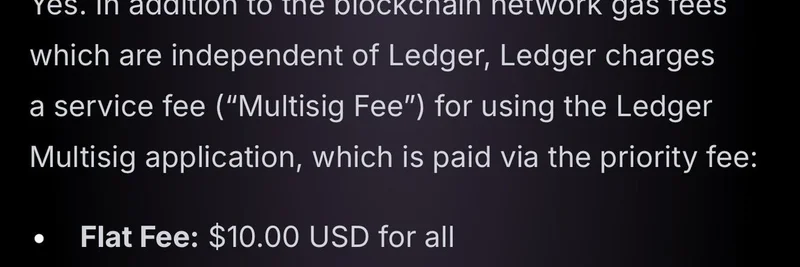In the fast-paced world of crypto, where security is everything, a recent tweet from Austin Federa, co-founder of Double Zero and former strategy lead at Solana, has stirred up quite the conversation. Quoting blockchain investigator ZachXBT's post about Ledger's extra fees on top of their hardware wallet purchases, Federa expressed concerns that the industry might be "losing the plot" due to an influx of business-minded folks prioritizing profits over user-friendly innovation.
Understanding the Controversy
Let's break it down. Ledger, a popular hardware wallet provider, recently rolled out a multisig solution aimed at teams and organizations for secure on-chain governance. Multisig, short for multi-signature, is a security feature that requires multiple approvals before a transaction can go through—think of it as a digital safe that needs several keys to open. It's especially useful for meme token projects managing community treasuries or DAOs handling volatile assets.
But here's the rub: on top of the usual blockchain gas fees, Ledger tacks on their own "Multisig Fee." As shown in the screenshot from their FAQ, it's a flat $10 for most transactions or 0.05% of the transferred amount for token transfers. ZachXBT called this "a bit excessive," especially since users already shelled out for the Ledger device itself. Federa echoed this sentiment, pointing out how such fees, combined with questionable practices from "qualified custodians" offering little real insurance, are pushing the crypto space away from its decentralized roots.
For context, check out the original tweet and Ledger's own explanation in their blog post.
Why This Matters for Meme Token Enthusiasts
If you're deep into meme tokens on chains like Solana, where things move lightning-fast and black swan events (those rare, high-impact surprises) can wipe out holdings in a blink, robust security without extra costs is crucial. Meme coin communities often rely on multisigs to safeguard funds for marketing, liquidity pools, or giveaways. Paying premium fees just to use a feature on a device you own feels like a step backward, especially when alternatives exist that align better with crypto's ethos of accessibility and low friction.
Federa suggests ditching these high-cost options for something like Squads Protocol, a Solana-based multisig platform that's gaining popularity for its efficiency and cost-effectiveness. Squads lets you manage assets securely without the bloat of legacy systems, replacing centralized servers with blockchain-native tech. It's particularly appealing for meme token creators who want to focus on virality and community engagement rather than navigating fee structures.
Exploring Better Alternatives
Speaking of alternatives, Squads Protocol stands out as the "autonomous finance layer" on Solana. It offers features like programmable vaults and seamless integrations, all without the exorbitant add-ons. For meme token projects, this means better protection against hacks or insider risks—key in a space where hype can attract bad actors.
Other options in the multisig wallet arena include open-source tools, but Squads' focus on Solana makes it a natural fit for the meme ecosystem, where speed and low fees are non-negotiable. As the crypto community pushes back against profit-driven decisions, tools like these remind us why decentralization matters: empowering users without unnecessary barriers.
In the end, this debate highlights a broader shift—crypto isn't just about making money; it's about building systems that are fair, secure, and inclusive. If you're managing meme token assets, it's worth evaluating your setup to avoid those "MBA-induced" pitfalls Federa warns about. Stay vigilant, and keep building.


